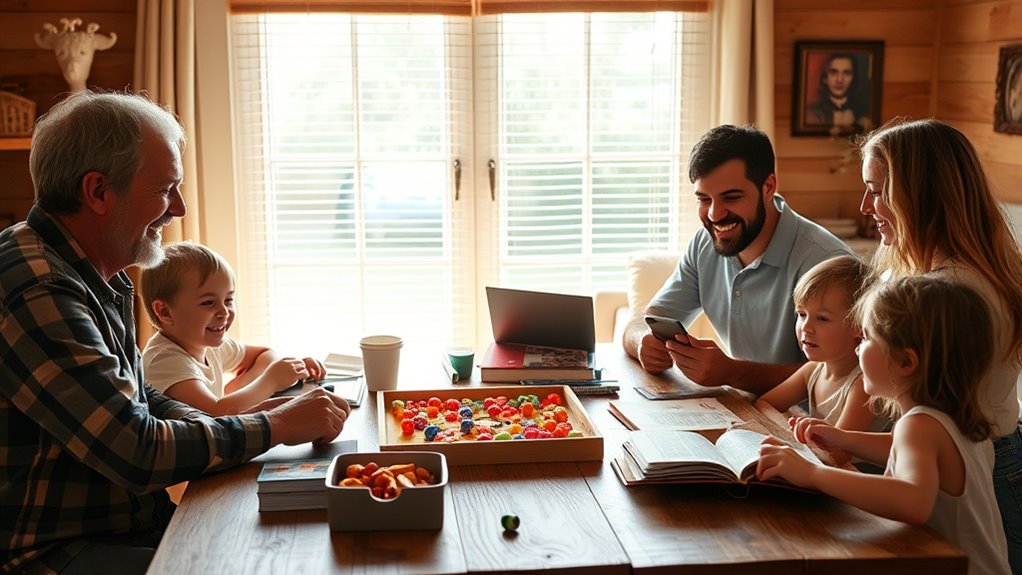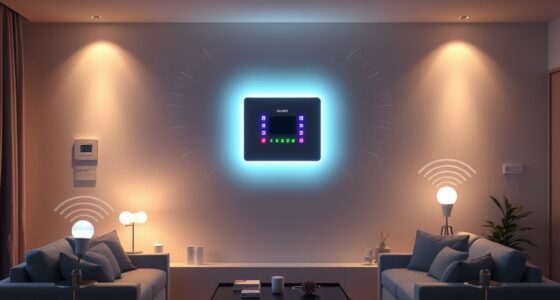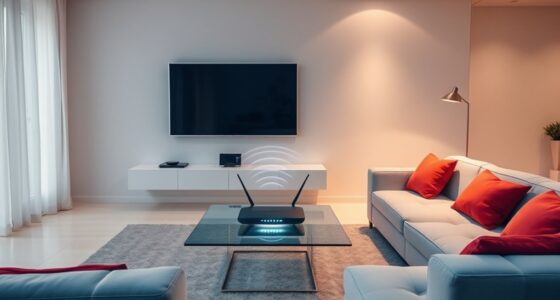A “dumb day” can substantially boost your family’s happiness by reducing digital overload and encouraging quality interactions. When you disconnect from screens, you create space for meaningful conversations, laughter, and shared experiences. Kids feel more connected, and parents can better engage with their loved ones. Regular tech-free days help lower stress and improve overall well-being. If you want practical ideas and insights on making this happen, keep exploring how a simple break can transform family life.
Key Takeaways
- A “Dumb Day” reduces digital overload, allowing families to reconnect and enjoy quality face-to-face interactions.
- Regular screen-free days help decrease stress and anxiety, promoting overall family happiness and well-being.
- Unplugging encourages shared activities, laughter, and storytelling, strengthening emotional bonds within the family.
- Tech-free days improve communication, focus, and presence, making family members feel more valued and understood.
- Implementing “Dumb Days” fosters mindfulness and simple pleasures, contributing to a happier, more balanced family life.
Understanding the Impact of Digital Overload on Families

Digital overload has become a pervasive issue that directly affects family dynamics. When everyone’s glued to social media or screens, it’s easy to miss meaningful moments with loved ones. Constant notifications and digital distractions can create emotional distance, reducing quality time and communication. Kids might feel ignored, while parents struggle to connect beyond their devices. To combat this, a digital detox can help reset family interactions, encouraging face-to-face conversations and shared experiences. Reducing screen time allows everyone to focus on each other, fostering stronger bonds. Recognizing the impact of digital overload is the first step toward healthier family relationships. Incorporating screen-free activities into daily routines can further promote genuine connections. By intentionally unplugging, you create space for genuine connection, making your family happier and more connected in the long run.
The Concept of a “Dumb Day” and Its Origins

A “Dumb Day” is an intentionally designed break from screens and digital devices, allowing you to disconnect and recharge. Its origins stem from the idea of a digital detox, giving families a chance to step away from constant notifications and social media. This concept often ties into tech-free traditions, where families commit to spending a day without technology to reconnect more meaningfully. The term itself encourages simplicity and mindfulness, emphasizing the value of low-tech activities like playing outside, reading, or sharing meals. While the idea has gained popularity recently, its roots are grounded in long-standing practices of unplugging to foster genuine connections. A “Dumb Day” offers a revitalizing way to reset your family’s digital habits and prioritize real-world interactions.
Benefits of Unplugging for Family Dynamics

Unplugging from screens can considerably strengthen family bonds by encouraging more meaningful interactions. Creating a digital detox allows everyone to focus on the present moment, fostering genuine conversations and shared experiences. Establishing a tech free zone in your home or during certain hours helps reduce distractions, making family time more engaging. When you disconnect, you open space for laughter, storytelling, and active listening, which deepens relationships. Consider this table to understand some key benefits:
| Benefit | Impact | Example |
|---|---|---|
| Better communication | Improved understanding and trust | Sharing daily stories |
| Reduced stress | Less digital overload, calmer minds | Relaxed family evenings |
| Increased bonding | Stronger emotional connections | Playing board games |
| Improved focus | More attention on family activities | Cooking together |
| Enhanced happiness | Overall family well-being | Celebrating small moments |
Additionally, engaging in educational toys can foster development and cooperation among children during family time.
Practical Tips for Implementing a Screen-Free Day

Implementing a screen-free day requires some planning and commitment, but the rewards are well worth it. Start by choosing a specific day when everyone’s available and set clear expectations. Create designated tech free zones in your home, such as the dining area or living room, to encourage face-to-face interactions. Prepare engaging screen free activities like board games, outdoor adventures, or arts and crafts to fill the day with fun. Communicate your plan ahead of time so everyone knows what to expect and feels involved. Keep the atmosphere positive, and be flexible if needed. Remember, the goal is to reconnect and enjoy each other’s company without digital distractions. Incorporating a tech-free environment can significantly enhance the quality of your family’s time together. With a little preparation, your family can experience a meaningful, unplugged day together.
Real-Life Stories and Research Supporting a Break From Technology

Research consistently shows that taking regular breaks from technology can substantially improve mental health, focus, and overall well-being. Many families have shared stories of how a digital detox transformed their lives, creating a stronger bond and reducing stress. For example, some parents established a tech-free zone during dinner, which led to more meaningful conversations and happier moments. Studies also support this, showing that disconnecting from screens helps decrease anxiety and promotes better sleep. These real-life experiences highlight the positive impact of setting aside a “dumb day” or creating a designated tech-free zone. When you step away from devices, you allow your family to reconnect and enjoy simple pleasures, proving that a break from technology isn’t just good for your mind — it’s good for your relationships too. Additionally, embracing mindfulness techniques during these breaks can further enhance emotional well-being and foster deeper family connections.
Frequently Asked Questions
How Often Should Families Schedule a “Dumb Day” for Optimal Benefits?
You should plan a “dumb day” about once a month to experience the benefits. This frequency allows your family to enjoy a break from routine, fostering activity variety and stronger bonds. Regularly scheduling these days helps everyone unwind, reduces stress, and encourages spontaneous fun. Keep it simple and flexible, so your family looks forward to these relaxed times together, making them a valuable part of your overall activity planning.
What Are Common Challenges Families Face When Trying to Unplug Together?
You might struggle to unplug as a family because technology dependence makes it hard to disconnect. Parental boundaries can be blurry, leading to kids expecting constant access or screen time. Challenges include resisting the urge to check devices, managing differing interests, and setting consistent rules. To succeed, you need clear boundaries, patience, and a commitment to prioritize quality time over screens, creating a more connected and happier family environment.
Can “Dumb Days” Improve Children’S Social Skills and Emotional Health?
Imagine a gust of fresh air clearing a foggy window—that’s what a “dumb day” can do for your kids’ social skills and emotional health. When you embrace a digital detox and focus on playful interaction, you open the door for genuine connection. These simple, unplugged moments help children learn empathy, patience, and communication. Your family can grow closer, turning ordinary days into treasured memories, nurturing happier, more confident kids.
Are There Specific Activities That Work Best During a “Dumb Day”?
You ask what activities work best during a “dumb day,” and the answer is simple: focus on creative activities and outdoor adventures. These options encourage genuine connection and allow you to unwind together. You might try painting, building forts, or playing sports outside. These activities help everyone relax, foster creativity, and strengthen family bonds, making your “dumb day” both fun and meaningful without the need for screens or structured plans.
How Do Cultural Differences Influence the Success of Screen-Free Days?
Cultural differences substantially shape how successful screen-free days are in your family. If your culture values outdoor activities and face-to-face interactions, your family might embrace these days more easily. Parental attitudes also matter; if parents see screen-free days as a positive family bonding opportunity, they’re more likely to succeed. Adapting your approach to fit your cultural expectations encourages participation and helps make these days a happier, more meaningful experience.
Conclusion
Taking a “dumb day” is like hitting the reset button on your family’s happiness. It clears away the digital fog, helping you reconnect and rediscover simple joys. By unplugging, you give your relationships room to breathe and grow stronger. Remember, sometimes the best way to move forward is to step back and enjoy the quiet. So, embrace the pause—you might just find your family’s happiness blooming in the silence.









